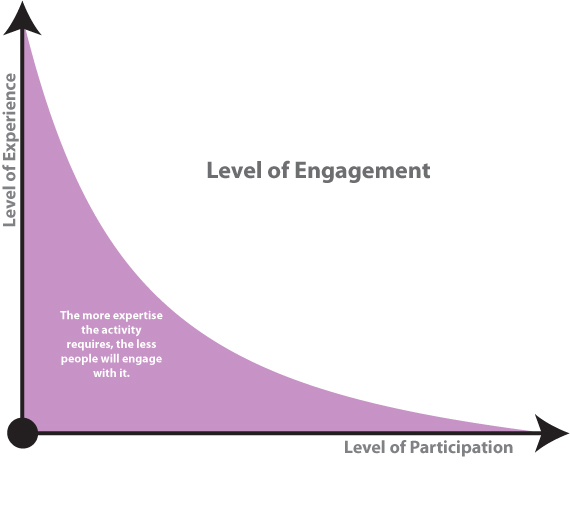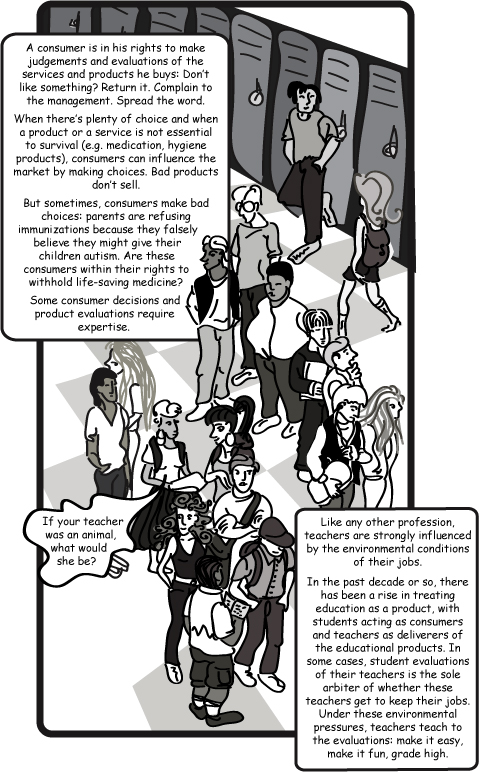We once had a client who made his secretary drive to our studio with a piece of a carpet from his office to be used as a color swatch for his company’s new logo. And while the final logo looked okay (very logo-like), it did little to represent the company’s brand. The company is no longer around today. Having a client who opines on the color of the background, choice of typeface, thickness of line, or layout mars the design process. It’s easy to get lost in details and personal preferences—who is to say that green is better than orange? A good designer has to be able to manage the client, keep the conversation focused on business goals and user needs. But before we can delve into the design process, we have establish trust. Clients need to feel like they’ve been listened to, they have to know and understand that design is hard work, and they have to buy into our expertise. The First Date The initial group meeting between the design firm and their client tends to feel like a first date: this is a chance for everyone to declare their expertise and expectations of each other. And like a…
Tag Archive for education
Background Knowledge, Conceptual Design, Contributor, Cultural Bias, Cultural Differences, Flow, Interaction Design, Interface Design, Product Design Strategy
Using Computers to Teach Children Without Teachers
by Sheetal Elangovan •
Johnathan, F . (2010). “Using computers to teach children with no teachers” BBC News. Retrieved on 21 July, 2010: http://www.bbc.co.uk/news/technology-10663353?print=true Summary of the article: The article summarizes studies conducted by Prof Mitra on the learning curve of children using computers for education with teachers. Results of the study prove that the teaching methods employed have been quite successful based on the fact that: Children who are not exposed to computers are highly motivated to teach themselves skills they want to learn Children have had a steep learning curve in picking up complex tasks with minimum supervision Learning by discussion and in groups ensures that content is retained and not skimmed through by children. Motivation levels of students are kept high with a grandmother figure in the picture. The best results of the study have been combined to create Self Learning Environments where children in groups of 4 share a computer to assimilate information. Virtually present volunteer grandmothers keep the student motivated and support the learning process. On Environment: The need for self-organized learning essentially arises in developing nations and the ones who do not have access to education. Children living in such conditions have a natural survival instinct, which keeps…
Background Knowledge, Background Knowledge Errors, Cognitive Blindness, Pipsqueak Articles, Product Design Strategy, ZPD
Science vs. Media: Degree of Public Involvement
by Olga Werby •

Recently, there has been an explosion of public discourse (fueled by the media) on whether we should do away with tenure in our institutions of higher learning. The basic argument boils down to “tenured teachers can do as they please due to job security and education suffers as the result.” Tenured professors, we are told, focus on research and publishing incomprehensible articles aimed at a few individuals in the world who could even understand them. What’s the use in that, people ask? My son/daughter/neighbor’s kid are being taught by a TA (with poor language skills) while we pay thousands of dollars for the privilege of these children attending universities with all those lazy good-for-nothing tenured professors! You might say that my summary of this world-view is extreme and simplifies the ideas to their comic representation. But that’s the point: the articles (and the readers’ comments they inspire) are written to get an emotional response. The issues of tenure, of the research that these tenured professors are engaged in and the articles they publish, and of teaching styles are complex. To evaluate the contribution of a scientist to his field, one needs to have a certain amount of expertise in that…
Background Knowledge Errors, Conceptual Design, Errors, Ethnographic & User Data, Interaction Design, Interface Design, Mental Model Traps, Mirroring Errors, Pipsqueak Articles, Product Design Strategy, Users
Metacognition Failure: If I find it easy, it must not be important
by Olga Werby •

Making something easy to understand is extremely difficult. A good designer knows this, knows how hard one has to work to make something comprehensible and easy to use. Unfortunately, users and consumers of products (including education) tend not to get it. We live in society ruled by “More is Better” p-prim: more stuff is better, more money is better, more food is good, more medication is great…more, more, more. Movies, television, newspapers, magazines, all reinforce this idea in our minds. We live in a “super-size me” world. But this basic decision-making algorithm leads to very faulty reasoning. There are multiple corollaries to the “more is better” axiom: thick books without graphics are more educationally valuable, more important (this is based on research I did many years ago with 5th graders); longer essays are clearly better and should get higher graders (the students worked harder/longer on them); big words are better than small ones in expressing ideas (thus we get very pretentious writing); work should be judged by the time it took to complete and not by the quality of the results it produces; more expensive clothes (cars, stereos, etc.) are clearly more valuable (this is a true statement, but most…
Attention, Attention Controls Errors, Conceptual Design, Contributor, Interaction Design, Product Design Strategy, Users, Working Memory
On “The Children of Cyberspace: Old Fogies by Their 20s” by Stone
by Anne •
Stone, B. (2010). “The Children of Cyberspace: Old Fogies by Their 20s.” The New York Times. Retrieved 30. June, 2010. http://www.nytimes.com/2010/01/10/weekinreview/10stone.html?pagewanted=1&_r=1 Summary: Stone points out the significant generational difference gaps due to the rapid rate at which technology is developing. Kids born into the world today are growing up in a time when high-tech devices like the Kindle, iPads, iPhones, and Skype are part of daily life. With such technology as a normal part of these kid’s lives, they’re going to participate in and view the world in a much different way than individuals born fifty, twenty, or even ten years ago. Today’s young kids are going to have distinctive expectations of the world. Researchers are looking into the result of this accelerated technological change, and many theories have been posited. For example, growing up with the iPhone and iPad these kids will probably expect all computers to have touch screens. Dr. Larry Rosen’s ideas about the “i-generation” are referenced in the article, stating that these kids who were born in 90’s and this decade communicate through texting and instant messaging and have a higher multi-tasking capacity – performing seven tasks at a time during their down-time rather than the…
Conceptual Design, Contributor, Errors, Ethnographic & User Data, Interaction Design, Interface Design, Language, Product Design Strategy, Scaffolding, Users
On “Singing ‘Rewires’ Damaged Brain”
by Aureliea •
Gill, V. (2010). “Singing ‘Rewires’ Damaged Brain.” BBC World News. Visited on 24 June 2010. http://news.bbc.co.uk/2/hi/science/nature/8526699.stm Summary: This article discusses how singing can teach stroke patients to recover their speech abilities. Singing uses a different part of the brain than the areas that involve speech. The idea is that if the “speech center” of the brain is damaged patients can use their “singing center.” Already established as a medical technique, “melodic intonation therapy” was further studied by the Beth Israel Deaconess Medical Center and Harvard Medical School with the findings presented to the American Association for the Advancement of Science. Using medical technology to scan the brain doctors were able to deduce that most speech took place on the left side of the brain, but melody and singing took place on the right side. This study is one of many larger studies examining the general effects of music and the brain. Dr Nina Kraus, a neuroscientist from Northwestern University, has concluded that musical training is an important part of children’s education. This article is important because many people have experienced or know someone who has experienced a stroke. Reading this article may prompt further investigation for those affected to seek…
Background Knowledge, Background Knowledge Errors, Cognitive Blindness, Contributor, Cultural Bias, Cultural Differences, Diagnostic Errors, Ethnographic & User Data, Interface Design, Mental Model Traps, Product Design Strategy, Users
A Curiously French Complaint
by Cecilia •
Kirby, E. (2008). “ A Curiously French Complaint,” BBC News. Retrieved on 2008/12/13. http://news.bbc.co.uk/go/pr/fr/-/2/hi/programmes/from_our_own_correspondent/7779126.stm Summary: This article focuses on the cultural differences between the French and British populations in regards to their medical care. Each culture has their own script of understanding, which people rely to set their expectations during a medical crisis. The author Emma experienced a cultural ‘shock’ during her first encounter with a French doctor due to her vastly different set of expectations. She visits a doctor in France due to the severity of a sore throat, where she is “diagnosed with a severe lung infection, mild asthma and had in my hand a prescription for six different types of medicine, an appointment at the local hospital’s radiology department and an emergency referral to a specialist in pulmonary disease (article).” Upon her return to Britain a few days later, she visits her family physician, who within a few minutes diagnoses her with only a ‘common cold.’ Her article then explains how the French expect a much more sever diagnosis to support their physical suffering. France is also the leading country of consumers who take prescription medications. While in England, there’s a more ‘keep a stiff upper lip’…
